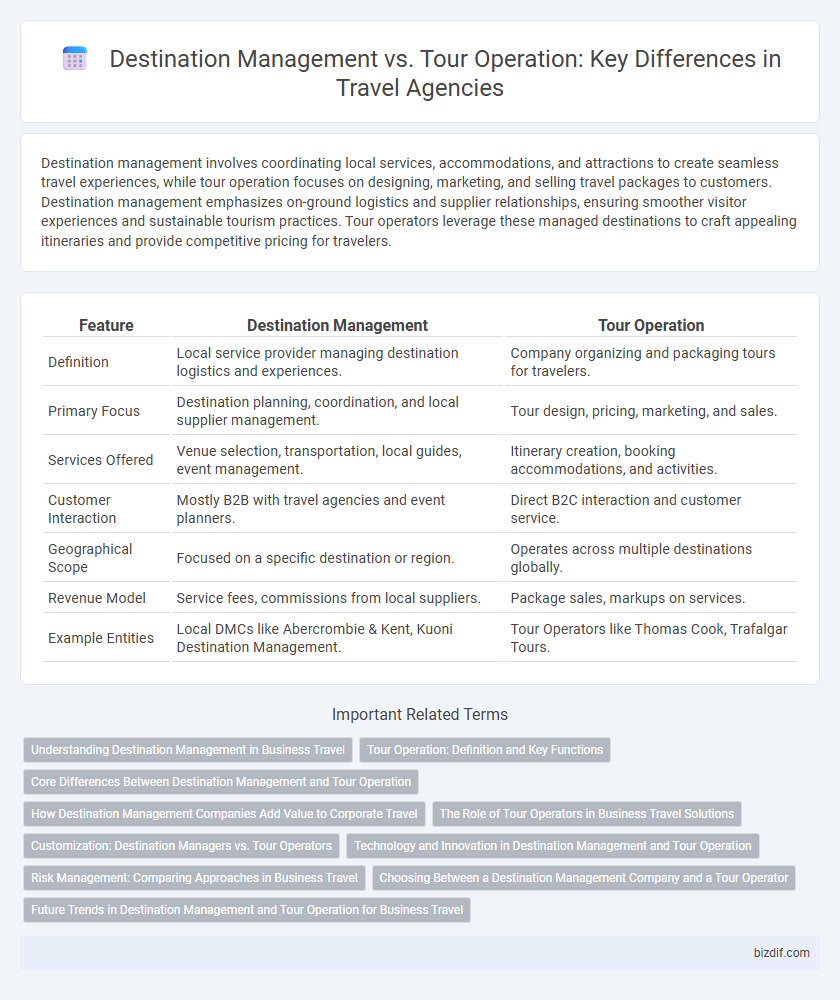Destination management involves coordinating local services, accommodations, and attractions to create seamless travel experiences, while tour operation focuses on designing, marketing, and selling travel packages to customers. Destination management emphasizes on-ground logistics and supplier relationships, ensuring smoother visitor experiences and sustainable tourism practices. Tour operators leverage these managed destinations to craft appealing itineraries and provide competitive pricing for travelers.
Table of Comparison
| Feature | Destination Management | Tour Operation |
|---|---|---|
| Definition | Local service provider managing destination logistics and experiences. | Company organizing and packaging tours for travelers. |
| Primary Focus | Destination planning, coordination, and local supplier management. | Tour design, pricing, marketing, and sales. |
| Services Offered | Venue selection, transportation, local guides, event management. | Itinerary creation, booking accommodations, and activities. |
| Customer Interaction | Mostly B2B with travel agencies and event planners. | Direct B2C interaction and customer service. |
| Geographical Scope | Focused on a specific destination or region. | Operates across multiple destinations globally. |
| Revenue Model | Service fees, commissions from local suppliers. | Package sales, markups on services. |
| Example Entities | Local DMCs like Abercrombie & Kent, Kuoni Destination Management. | Tour Operators like Thomas Cook, Trafalgar Tours. |
Understanding Destination Management in Business Travel
Destination management in business travel involves coordinating local services, venues, and logistics to ensure seamless corporate events and meetings, emphasizing tailored experiences and operational efficiency. Tour operation, by contrast, focuses on packaging and selling predefined travel products, often for leisure travelers. Understanding destination management enables travel agencies to offer comprehensive solutions that enhance client satisfaction through expert local knowledge and resource integration.
Tour Operation: Definition and Key Functions
Tour operation involves designing, packaging, and selling travel experiences by coordinating transportation, accommodations, and activities. Key functions include itinerary planning, supplier negotiation, pricing strategies, and customer service management to ensure seamless travel experiences. Tour operators act as intermediaries, combining various travel components into a single product for efficient distribution and sales.
Core Differences Between Destination Management and Tour Operation
Destination management focuses on local expertise, coordinating services such as accommodation, transportation, and activities within a specific region to create seamless travel experiences. Tour operation involves designing, packaging, and selling complete travel itineraries to customers, often bundling multiple destinations, accommodations, and inclusions into market-ready products. The core difference lies in destination management handling on-ground logistics and partnerships, while tour operation emphasizes product development and customer sales.
How Destination Management Companies Add Value to Corporate Travel
Destination Management Companies (DMCs) enhance corporate travel by providing localized expertise, customized experiences, and seamless coordination of logistics such as transportation, accommodations, and event planning. Their deep knowledge of the destination ensures cost-effective solutions and risk management tailored to corporate needs. By integrating local vendor relationships and cultural insights, DMCs deliver personalized services that elevate corporate travel efficiency and employee satisfaction.
The Role of Tour Operators in Business Travel Solutions
Tour operators play a crucial role in business travel solutions by designing comprehensive packages that cater specifically to corporate needs, including accommodation, transportation, and meeting venues. They streamline logistics, ensuring efficiency and cost-effectiveness while managing vendor relationships and on-ground services. Unlike destination management companies that focus on local ground services, tour operators coordinate end-to-end travel arrangements, enhancing the overall business travel experience.
Customization: Destination Managers vs. Tour Operators
Destination managers specialize in customizing travel experiences by tailoring local services, accommodations, and activities to client preferences, ensuring an immersive and authentic visit. Tour operators focus on creating packaged tours with predefined itineraries, balancing cost efficiency and broad appeal while offering limited flexibility for individual customization. The choice between destination management and tour operation hinges on the level of personalization and control desired in the travel experience.
Technology and Innovation in Destination Management and Tour Operation
Technology in destination management leverages geographic information systems (GIS), mobile applications, and virtual reality to enhance traveler engagement and customize experiences based on real-time data analytics. Tour operations integrate booking platforms, AI-driven itinerary planners, and customer relationship management (CRM) systems to streamline logistics and personalize services efficiently. Innovations such as blockchain for transparent transactions and IoT for smart accommodations further differentiate destination management from traditional tour operation by deepening local resource integration and visitor interaction.
Risk Management: Comparing Approaches in Business Travel
Destination management focuses on local expertise and resources to mitigate risks by coordinating with suppliers, authorities, and healthcare services within a specific location. Tour operation emphasizes comprehensive pre-planning, including risk assessment and contingency strategies covering multiple destinations and transportation modes. Both approaches integrate real-time communication and emergency protocols, but destination management offers more tailored location-based risk control for business travel.
Choosing Between a Destination Management Company and a Tour Operator
Choosing between a Destination Management Company (DMC) and a Tour Operator depends on the scope and customization of your travel needs. DMCs specialize in local expertise, providing tailored services such as event planning, transportation, and unique experiences within a specific destination, ideal for corporate events and destination weddings. Tour Operators manage the entire travel package, including itinerary creation, accommodation, and guided tours, offering a comprehensive solution best suited for leisure travelers seeking convenience and all-inclusive deals.
Future Trends in Destination Management and Tour Operation for Business Travel
Future trends in destination management emphasize sustainable tourism practices, advanced digital platforms for personalized itinerary planning, and integration of virtual reality for immersive pre-trip experiences. Tour operations are increasingly leveraging AI-driven analytics to optimize logistics, enhance traveler safety protocols, and offer flexible, customizable business travel packages. The convergence of smart technology with eco-friendly solutions is set to redefine efficiency and client satisfaction in business travel management.
Destination management vs Tour operation Infographic

 bizdif.com
bizdif.com